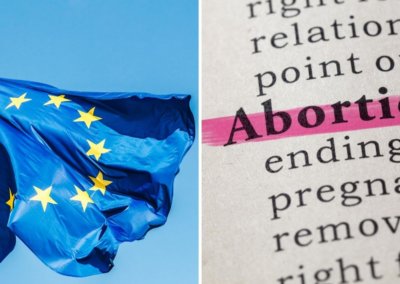A change to abortion law in Poland that will protect babies with disabilities including Down’s syndrome, cleft lip and cleft palate, came into effect at midnight on Wednesday 27th January 2021.
This followed the highest court in Poland publishing its reasoning for a verdict that protects disabled unborn babies from “eugenic” abortion.
The Constitutional Tribunal made the ruling in October last year but it was not published until Wednesday 27th January. The ruling found that abortions on the grounds of disability were to be prohibited as being incompatible with the Polish Constitution.
Specifically, the Court found that the ‘Family Planning, the Protection of Foetuses, and Grounds for Permitting the Termination of a Pregnancy Act’ 1993 was inconsistent with Articles 38, 30 and 31 of the Polish Constitution.
The ruling explained that the “provisions [of the Act] legalise eugenic practices with regard to the right to life”, and that the Act “correlate[s] the protection of the unborn child’s right to life with the child’s state of health, which constitutes prohibited direct discrimination”.
The Court ruled that the direct lethal discrimination against babies with disabilities through abortion was inconsistent with the Constitution of the Republic of Poland.
Abortion will now be permitted in Poland only in cases of rape or incest, or if the mother’s life is in danger.
Public support for pro-life laws
While there have been some protests by abortion supporters against this new move, polling has revealed there is strong support for pro-life measures in the country with the majority of the populace being firmly opposed to abortion.
A CBOS survey found that 75% of Polish people think abortion is “always wrong and can never be justified”. Meanwhile, only 7% thought there was “nothing wrong with it and could always be justified”.
Additionally, last year a ‘Citizens’ initiative against eugenic abortion’ supporting a ban on disability-selective abortion gathered 830,000 signatures from Polish residents, indicating further strong support for the change in law.
UK legal challenge
The High Court in London will hear a landmark case against the UK Government over the country’s discriminatory abortion legislation.
Currently in England, Scotland and Wales, the law singles out babies with disabilities, such as cleft lip, club foot and Down’s syndrome, and allows terminations right up to the point of birth. However, there is a 24-week time limit for most abortions that are carried out when a baby does not have a disability.
Heidi Carter, a 25-year-old woman with Down’s syndrome, and Máire Lea-Wilson, whose nineteen-month-old son Aidan also has the condition, both believe this is “deeply offensive” and have joined forces to challenge the law.
Right To Life UK spokesperson, Catherine Robinson, said: “Whilst certain sections of the media and even the European Parliament are attempting to cast this law in bad light, it is undeniably a good thing. There is simply no defence for laws which unjustly target people with disabilities, laws which allow doctors to end the lives of babies in the womb just because they are disabled”.
“There is a profound contradiction in our culture between the efforts it makes to accommodate the specific needs of people with various disabilities and the fact that lethal discrimination for babies with disabilities is written into law. Babies in the UK can be aborted up to birth if the child is disabled. Thankfully, the Polish Constitutional Tribunal has recognised this contradiction and has now rectified it. People with disabilities deserve the same protection under law as everyone else”.












